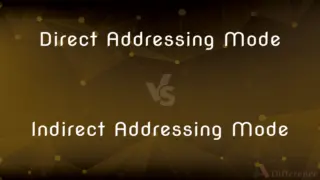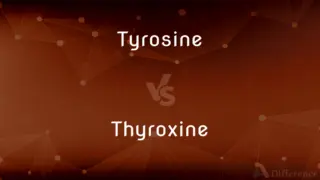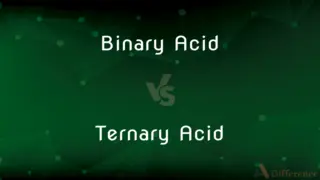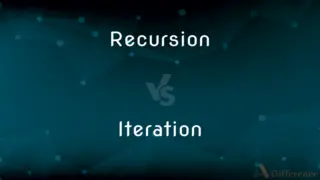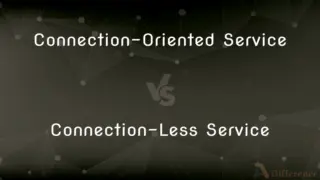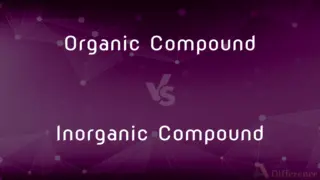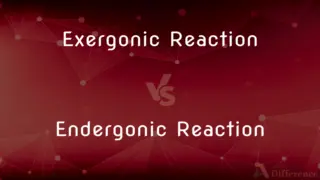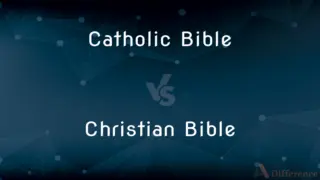Orc vs. Troll — What's the Difference?
By Tayyaba Rehman — Published on October 8, 2023
Orcs are often portrayed as aggressive, humanoid creatures, typically serving dark powers. Trolls, on the other hand, are larger, brutish beings known for their regenerative abilities and often dwelling under bridges or in caves.
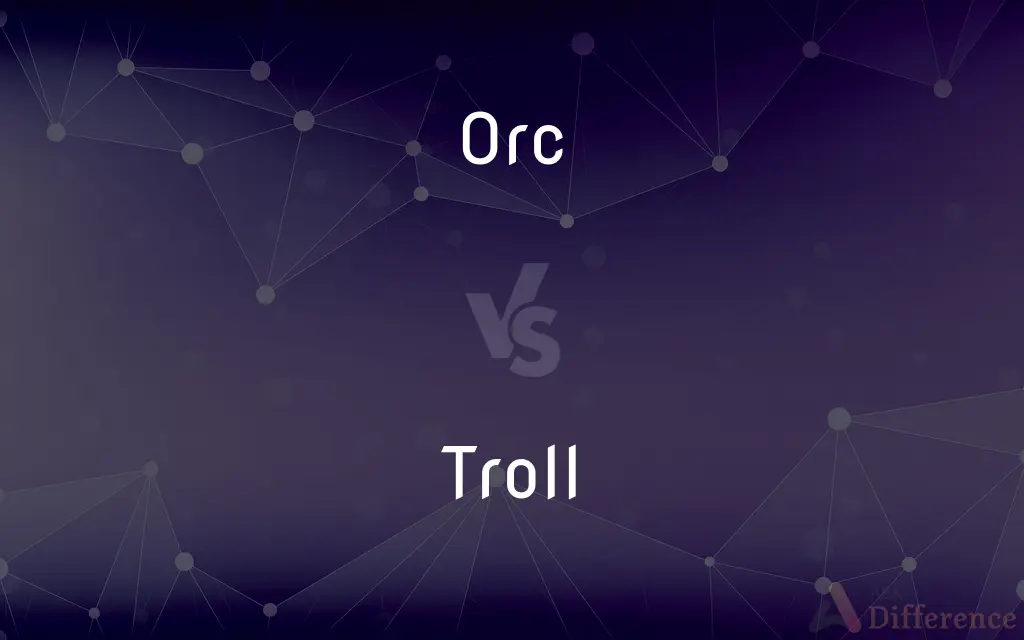
Difference Between Orc and Troll
Table of Contents
ADVERTISEMENT
Key Differences
Orcs and trolls are mythical creatures that have been depicted in various folklore and fantasy literature, each having its unique characteristics and lore. Orcs are frequently described as humanoid beings, often green-skinned and fierce, commonly associated with evil intentions or allegiances. They might be found in armies, serving dark lords or participating in organized tribal societies, striving for power or domination.
Trolls, conversely, are usually depicted as solitary, massive creatures, often with the ability to regenerate or heal rapidly. Folklore often places them under bridges, challenging passersby, or lurking in mountainous or forested regions. While they are typically portrayed as slow-witted, their size and strength make them formidable foes. Their appearances can differ, with some descriptions leaning towards stone-like skin or distinct features.
Over time, the depiction of both orcs and trolls has evolved in literature, movies, and games. For example, in J.R.R. Tolkien's Middle-earth legendarium, orcs are corrupted elves twisted by dark powers, while trolls are large, monstrous beings that turn to stone in sunlight. Yet, in various role-playing games, orcs and trolls might have varied attributes, societies, or abilities.
Although both these creatures come from a backdrop of mythology and fantasy, their distinct characteristics, origins, and behaviors set them apart in the annals of fantasy literature and pop culture. Recognizing these differences is essential for any fantasy enthusiast or storyteller.
Comparison Chart
Origin
Commonly humanoid, linked to dark powers.
Large, solitary beings with regenerative abilities.
ADVERTISEMENT
Appearance
Often green-skinned, fierce-looking.
Massive, sometimes with stone-like skin.
Behavior
Aggressive, organized in tribes or armies.
Slow-witted, solitary, dwelling under bridges/caves.
Typical Affiliation
Often serve dark lords or strive for domination.
Usually neutral unless provoked.
Popular Depictions
Tolkien's corrupted elves, "Warcraft" warriors.
Folklore bridge-dwellers, Tolkien's stone creatures.
Compare with Definitions
Orc
A mythical humanoid creature, often aggressive and serving dark forces.
The orc charged forward, its eyes filled with rage.
Troll
A being that often resides under bridges or in caves in folklore.
The children were warned about the troll under the bridge.
Orc
A green-skinned being common in fantasy literature and games.
The village was under attack by a band of orcs.
Troll
A monstrous creature in Tolkien's literature, turning to stone in sunlight.
Adventurers had to be cautious of trolls during the night.
Orc
A corrupted creature in Tolkien's Middle-earth.
The orcs, once elves, were now twisted by dark magic.
Troll
A formidable foe due to its size and strength in fantasy tales.
Despite its slow nature, the troll was a threat to any warrior.
Orc
A warrior or soldier typically found in the ranks of dark armies.
The castle's defenses were breached by orcs.
Troll
To fish for by trailing a baited line from behind a slowly moving boat.
Orc
A member of organized tribal societies in some role-playing games.
The orc chieftain led his tribe with ruthless determination.
Troll
To fish in by trailing a baited line
Troll the lake for bass.
Orc
(archaic) Any of several large, ferocious sea creatures, now especially the killer whale.
Troll
To trail (a baited line) in fishing.
Orc
A mythical evil monstrous humanoid creature, usually quite aggressive and often green.
Troll
To move around in (an area) or go to (different places) searching for something
"The players cautiously refrain from saying anything candid to the press trolling the clubhouse" (David Grann).
Orc
A Russian soldier or gangster.
Troll
To examine or search through
Trolling the classifieds for a cheap car.
Orc
Any of several cetaceans, especialy the grampus (Grampus griseus) of the dolphin family.
An island salt and bare,The haunt of seals, and orcs, and sea-mews' clang.
Troll
To sing in succession the parts of (a round, for example).
Orc
A mythical monster of varying descriptions; an ogre.
Goblins, hobgoblins, and orcs of the worst description.
Troll
To sing heartily
Troll a carol.
Orc
The orca.
Troll
To post inflammatory or irrelevant material on (an electronic forum) to provoke responses.
Troll
To fish by trailing a line, as from a moving boat.
Troll
To stroll along or wander
"As he was extremely early, he trolled past the community center" (David Bezmozgis).
Troll
To move around in an area or go to different places searching for something.
Troll
To examine or search through something
Trolling through old family photos looking for a picture of my aunt.
Troll
(Music) To sing heartily or gaily.
Troll
The act of trolling for fish.
Troll
A lure, such as a spoon or spinner, that is used for trolling.
Troll
(Music) A vocal composition in successive parts; a round.
Troll
A person who posts inflammatory or otherwise unwanted material on an electronic forum, especially anonymously.
Troll
The material so posted.
Troll
A supernatural creature of Scandinavian folklore, variously portrayed as a friendly or mischievous dwarf or as a giant, that lives in caves, in the hills, or under bridges.
Troll
(Derogatory) A person, especially an older gay man, considered to be unpleasant or ugly.
Troll
(fantasy) A supernatural being of varying size, now especially a grotesque humanoid creature living in caves or hills or under bridges.
Troll
(slang) An ugly person of either sex, especially one seeking sexual experiences.
Troll
Optical ejections from the top of the electrically active core regions of thunderstorms that are red in color that seem to occur after tendrils of vigorous sprites extend downward toward the cloud tops.
Troll
An instance of trolling, especially, in fishing, the trailing of a baited line.
Troll
A person who posts or says inflammatory, insincere, digressive, extraneous, or off-topic messages to provoke others on the Internet for their own personal amusement or to manipulate others' perception.
Keyboard warrior
Troll
The act of moving round; routine; repetition.
Troll
A song whose parts are sung in succession; a catch; a round.
Troll
(obsolete) A trolley.
Troll
(intransitive) To saunter.
Troll
(intransitive) To trundle, to roll from side to side.
Troll
To draw someone or something out, to entice, to lure as if with trailing bait.
Troll
To fish using a line and bait or lures trailed behind a boat similarly to trawling; to lure fish with bait.
Troll
(transitive) To angle for with a trolling line, or with a hook drawn along the surface of the water; hence, to allure.
Troll
(transitive) To fish in; to try to catch fish from.
Troll
To stroll about in order to find a sexual partner.
He spends most of his waking hours trolling on WIRE.
Troll
To post or make inflammatory or insincere statements so as to attempt to lure others into combative argument for purposes of personal entertainment or to manipulate others' perception, especially in an online community or discussion.
Troll
To move circularly; to roll; to turn.
Troll
To send about; to circulate, as a vessel in drinking.
Troll
To sing the parts of in succession, as of a round, a catch, and the like; also, to sing loudly, freely or in a carefree way.
Troll
A supernatural being, often represented as of diminutive size, but sometimes as a giant, and fabled to inhabit caves, hills, and like places; a witch.
Troll
The act of moving round; routine; repetition.
Troll
A song the parts of which are sung in succession; a catch; a round.
Thence the catch and troll, while "Laughter, holding both his sides," sheds tears to song and ballad pathetic on the woes of married life.
Troll
A trolley.
Troll
To move circularly or volubly; to roll; to turn.
To dress and troll the tongue, and roll the eye.
Troll
To send about; to circulate, as a vessel in drinking.
Then doth she troll to the bowl.
Troll the brown bowl.
Troll
To sing the parts of in succession, as of a round, a catch, and the like; also, to sing loudly or freely.
Will you troll the catch ?
His sonnets charmed the attentive crowd,By wide-mouthed mortaltrolled aloud.
Troll
To angle for with a trolling line, or with a book drawn along the surface of the water; hence, to allure.
Troll
To fish in; to seek to catch fish from.
With patient angle trolls the finny deep.
Troll
To roll; to run about; to move around; as, to troll in a coach and six.
Troll
To move rapidly; to wag.
Troll
To take part in trolling a song.
Troll
To fish with a rod whose line runs on a reel; also, to fish by drawing the hook through the water.
Their young men . . . trolled along the brooks that abounded in fish.
Troll
(Scandanavian folklore) a supernatural creature (either a dwarf or a giant) that is supposed to live in caves or in the mountains
Troll
A partsong in which voices follow each other; one voice starts and others join in one after another until all are singing different parts of the song at the same time;
They enjoyed singing rounds
Troll
A fisherman's lure that is used in trolling;
He used a spinner as his troll
Troll
Angling by drawing a baited line through the water
Troll
Circulate, move around
Troll
Cause to move round and round;
The child trolled her hoop
Troll
Sing the parts of (a round) in succession
Troll
Angle with a hook and line drawn through the water
Troll
Sing loudly and without inhibition
Troll
Praise or celebrate in song;
All tongues shall troll you
Troll
Speak or recite rapidly or in a rolling voice
Troll
A large mythical creature known for its regenerative abilities.
The troll healed rapidly after the battle.
Troll
Sometimes depicted with stone-like or distinct features in various stories.
The troll's skin looked as hard as the mountain rocks.
Common Curiosities
Are orcs and trolls the same?
No, they are distinct creatures with different characteristics in folklore and fantasy literature.
Can trolls really regenerate in stories?
In many tales, trolls possess the ability to heal or regenerate rapidly.
Did Tolkien's depiction influence the modern view of orcs?
Yes, Tolkien's portrayal of orcs as corrupted elves has had a significant influence on modern fantasy.
What is an orc?
An orc is a mythical humanoid creature, often aggressive and associated with dark forces.
How have video games influenced the portrayal of orcs and trolls?
Video games have further diversified their attributes, societies, and roles, making them more dynamic in modern fantasy.
How is a troll typically portrayed in folklore?
Trolls are often depicted as large creatures dwelling under bridges or in caves, challenging passersby.
Are there female orcs and trolls?
Depending on the story, both orcs and trolls can have female counterparts.
Where did the concept of orcs originate?
The concept has roots in mythology but was popularized and expanded upon by fantasy literature, notably by J.R.R. Tolkien.
Are orcs intelligent?
Depictions vary, but orcs can be portrayed as cunning, strategic, or sometimes simple-minded.
Why are trolls associated with bridges?
Folklore often places trolls under bridges, posing riddles or challenges to passersby.
Can orcs and trolls communicate with humans in stories?
In many tales, both creatures can communicate, albeit in rough or guttural languages.
What's the main weakness of Tolkien's trolls?
They turn to stone when exposed to sunlight.
How do the physical strengths of orcs and trolls compare?
Trolls are usually stronger due to their size, but orcs can be fierce and formidable in groups.
Are there friendly orcs or trolls in literature?
While often portrayed as antagonists, some stories feature orcs or trolls as allies or neutral characters.
Do orcs and trolls have a sense of culture or society?
In many stories, orcs have tribal societies and hierarchies, while trolls are often more solitary, but exceptions exist.
Share Your Discovery

Previous Comparison
Duplication vs. Replication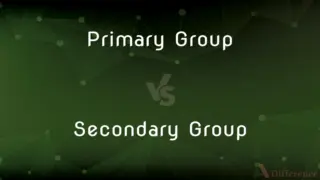
Next Comparison
Primary Group vs. Secondary GroupAuthor Spotlight
Written by
Tayyaba RehmanTayyaba Rehman is a distinguished writer, currently serving as a primary contributor to askdifference.com. As a researcher in semantics and etymology, Tayyaba's passion for the complexity of languages and their distinctions has found a perfect home on the platform. Tayyaba delves into the intricacies of language, distinguishing between commonly confused words and phrases, thereby providing clarity for readers worldwide.















